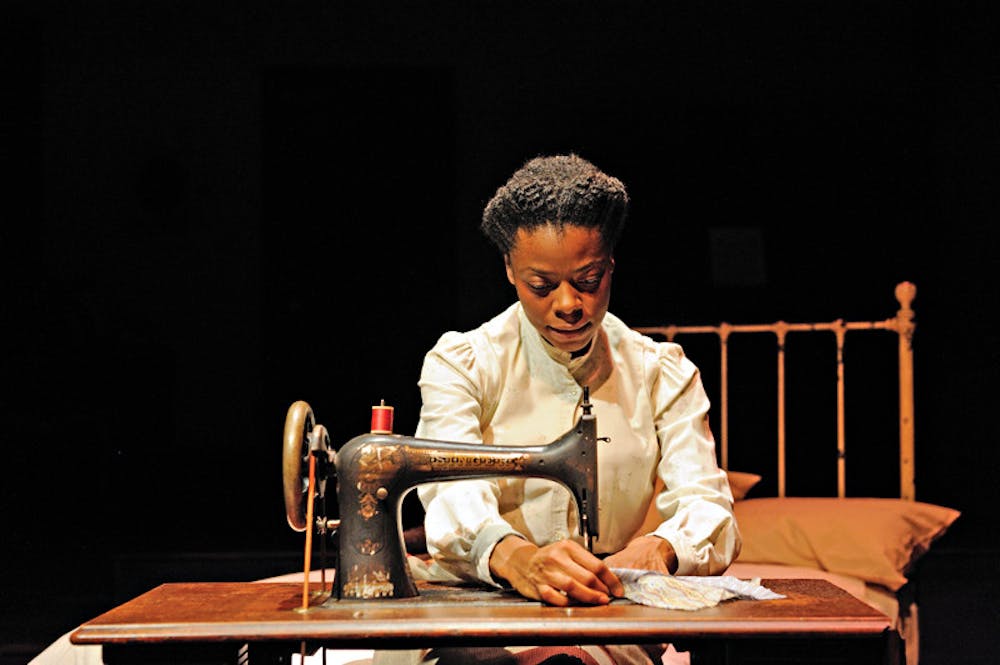When Esther Mills, a 35-year-old black woman living in New York City at the turn of the 20th century, admits to a client from Fifth Avenue, “I’ve only been to the theater once,” the audience members are made all too aware of their own privileged position. Viewers’ suit buttons and diamond necklaces glare in the dim theater light. The women in the audience who, prior to showtime, lamented the lack of coat racks realize their complaints mirror those of Esther’s high-society clients.
Now playing at Trinity Repertory Company, “Intimate Apparel,” directed by Janice Duclos and written by Pulitzer Prize-winning playwright Lynn Nottage ’86, brings to life the struggle of women and minorities searching for the American Dream before women’s suffrage and the civil rights movement.
Esther, played by Mia Ellis MFA’12, creates corsets for New York’s most tantalizing personalities without ever feeling the satin and beads against her own skin. Instead, Esther keeps her dreams sewn inside a quilt — she holes away money, saving up in hope of opening a beauty shop. She cannot read the letters she receives from a stranger working on the Panama Canal without her clients’ help.
In a particularly striking scene, this stranger — George, played by Joe Wilson, Jr. — writes Esther in a letter, “I cannot remember the smile of the water boy who died.” The sequence demonstrates the dehumanizing nature of work on the canal. But when he reaches New York at last, the transition is not as easy as expected. The streets feel more threatening than the jungle; he doesn’t have the right suit or hat to be offered a job.
Unlike a Shakespearean comedy, where the marriage ends all, Esther’s marriage to George comes at the end of Act 1 and serves to catalyze the rest of the play. What initially appears as a merely awkward relationship turns sour as problems of gambling, drinking and infidelity emerge.
“A suit tells more about a man’s character,” warns Esther’s landlady, Mrs. Dickson, about her relationship with George. “Any man can talk with tonic.”
Mrs. Dickson, a regal lady played by Trinity Rep veteran Barbara Meek, seems very much of the period while retaining a remarkably contemporary resonance.
Esther has limited freedom, but her profession allows her to cross social boundaries freely, interacting with both the lower and the upper classes. She visits women in their most intimate environments in the course of her duties as seamstress. Esther finds one of her clients, Mrs. Van Buren, played by Angela Brazil, alone and without comfort in a fancy Fifth Avenue apartment — her husband spat on her when she began to menstruate, because she is unable to produce a child. On the other side of the city, Esther finds a nightclub performer named Mayme, played by Shelley Fort, in her bathrobe, pounding on piano keys. She wants a corset like Mrs. Van Buren’s — and another bottle of gin. Her life is full of drunken nights and strangers who pay but don’t offer soft touches, not a bad life “for a colored girl,” she says.
Esther makes both women corsets of identical design, but each reacts differently. The corset makes Mrs. Van Buren feel exposed, the ridiculous beads dangling in desperation, but Mayme is enchanted by the frills. Hitching up her long skirt playfully, she says “it feels like Fifth Avenue.”
While black female identity takes center stage in “Intimate Apparel,” Nottage’s work also explores the difficulties confronting other cultural identities at the turn of the century, often through their clothing. Mr. Marks, an Orthodox Jewish fabric trader played by Mauro Hantman, emphasizes the family history of the black jacket he wears, which was passed down from his father and reminds him of his faith. His fingers stroke the exotic fabrics he persuades Esther to buy, but he cannot be touched by a woman that is not his mother, wife or sister.
“Intimate Apparel” not only serves as an interpretation of history, but also bears witness to an era of social upheaval intimately connected to its author, making the viewer all the more invested. Nottage based Esther’s character on the experiences of her great-grandmother, a Barbadian seamstress who immigrated to New York City and corresponded with a laborer working on the Panama Canal, according to the program. Each act closes with a still scene on stage that mirrors the historical black-and-white photographs projected onto screens in the theater.
“Intimate Apparel” does not have a tightly knit conclusion. Some relationships and events do not receive closure. Esther’s quilt lies in pieces by the end of the play, but her sewing machine remains.
“Intimate Apparel” runs Jan. 30 to March 2 in the Sarah and Joseph Dowling, Jr. Theater downtown.

ADVERTISEMENT




